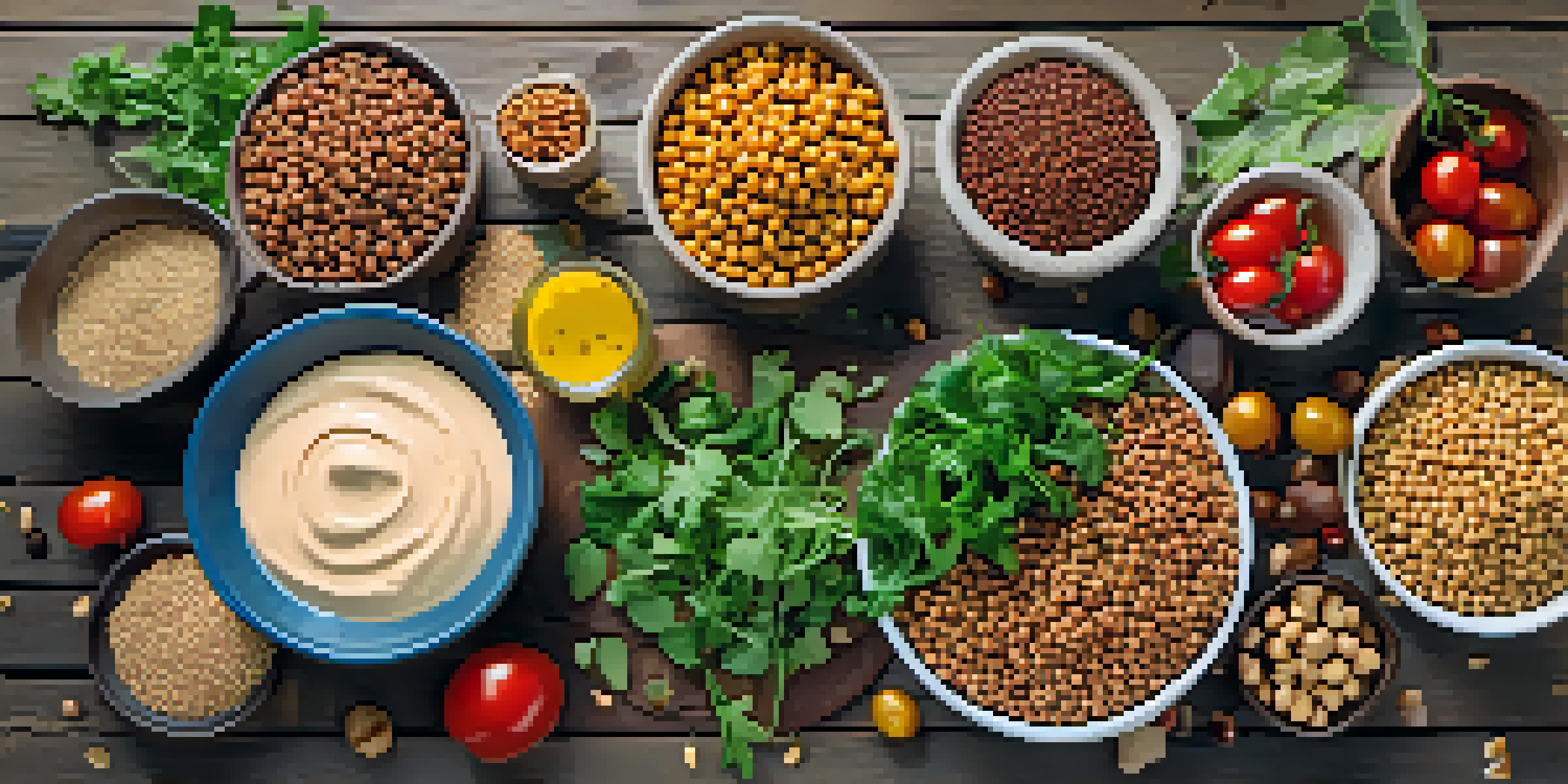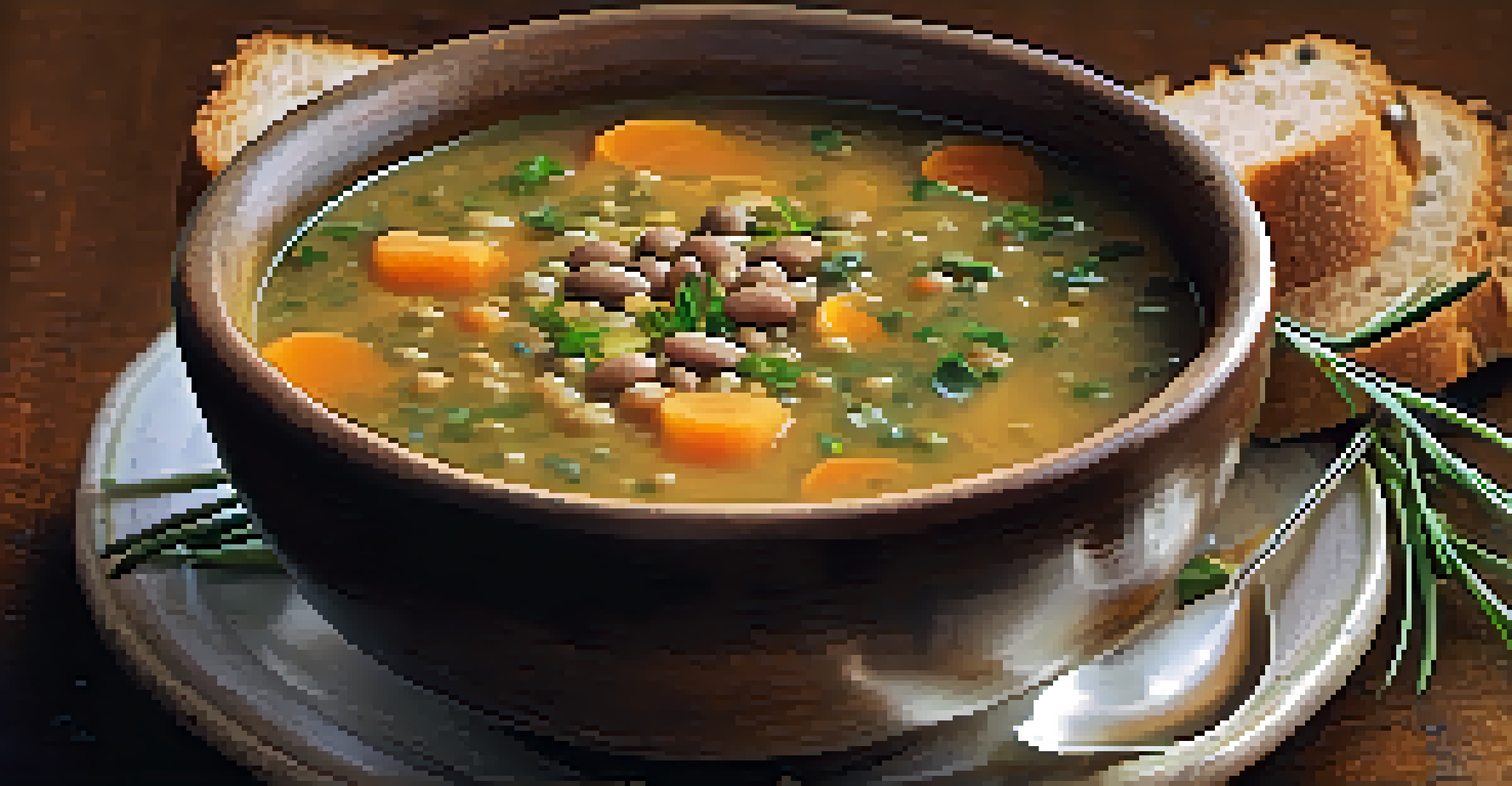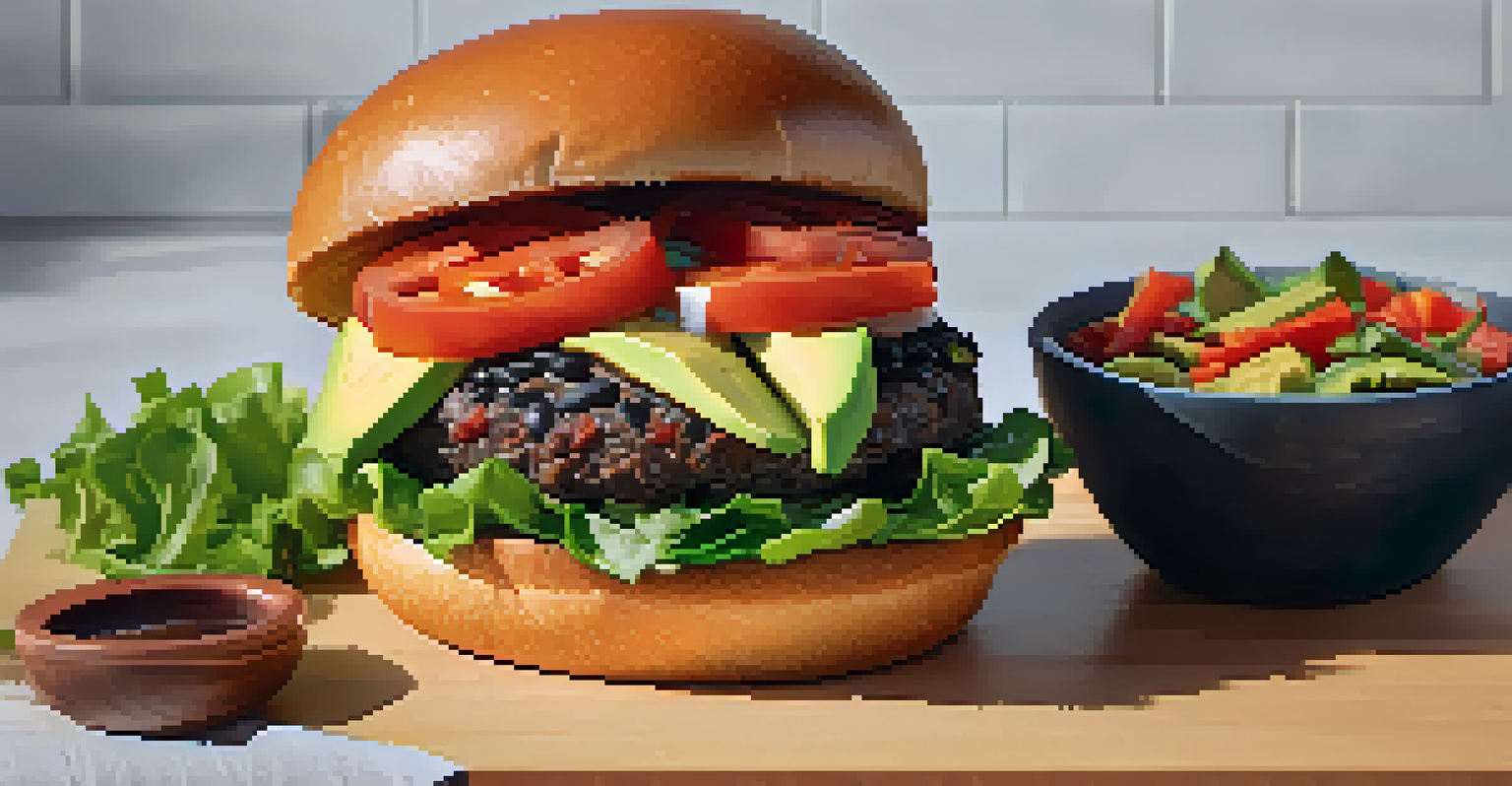Understanding Plant-Based Proteins for Vegetarian Cooking

What Are Plant-Based Proteins and Why They Matter
Plant-based proteins are derived from various plants, including legumes, nuts, and grains. They are essential for vegetarian cooking as they provide the necessary amino acids our bodies need to function properly. Unlike animal proteins, these sources can be lower in saturated fat and cholesterol, making them heart-healthy options.
Let food be thy medicine and medicine be thy food.
Incorporating plant-based proteins into your meals not only supports your health but also promotes a more sustainable food system. With the rise of vegetarianism and flexitarian diets, understanding these proteins has never been more important. It empowers home cooks to create nutritious and satisfying meals that align with their dietary choices.
For those new to plant-based cooking, the variety of available options can be overwhelming. However, with a little knowledge of different protein sources, you can easily integrate them into your daily meals. This exploration will lead to a more vibrant and diverse plate, enhancing both nutrition and flavor.
Common Sources of Plant-Based Proteins
Some of the most common sources of plant-based proteins include lentils, beans, chickpeas, quinoa, and tofu. Lentils, for example, are not only packed with protein but are also rich in fiber, making them a great addition to soups or salads. Similarly, chickpeas can be roasted for a crunchy snack or blended into hummus for a creamy dip.

Nuts and seeds, such as almonds, chia seeds, and hemp seeds, are also excellent protein sources. They can be sprinkled on salads, mixed into smoothies, or eaten as a snack. Additionally, whole grains like brown rice and oats contribute to your daily protein intake while providing essential vitamins and minerals.
Benefits of Plant-Based Proteins
Plant-based proteins provide essential amino acids while being lower in saturated fat and cholesterol, making them heart-healthy options.
Tofu and tempeh, often used in Asian cuisines, are fantastic alternatives to meat. They absorb flavors beautifully, making them versatile for stir-fries, curries, or even grilling. By incorporating a mix of these sources, you can easily meet your protein needs while enjoying a variety of textures and flavors.
How to Combine Plant Proteins for Complete Nutrition
One important aspect of plant-based proteins is that they may lack one or more essential amino acids. However, by combining different protein sources, you can create a complete amino acid profile. For example, pairing rice with beans or hummus with pita bread ensures you get all the essential amino acids your body needs.
You are what you eat, so don't be fast, cheap, easy, or fake.
This concept of protein combining is particularly useful for those following a vegetarian or vegan lifestyle. It allows you to maximize the nutritional value of your meals without relying on animal products. By being mindful of your combinations, you can enjoy a well-rounded and nutritious diet.
Experimenting with different combinations can also lead to culinary creativity. Try adding nuts to your stir-fry or mixing seeds into your baked goods. Not only will you boost the protein content, but you'll also introduce exciting flavors and textures to your dishes.
Cooking Techniques for Plant-Based Proteins
The way you prepare plant-based proteins can significantly impact their flavor and texture. For instance, soaking beans before cooking helps to soften them, making them easier to digest and reducing cooking time. Similarly, marinating tofu can infuse it with flavor, ensuring that every bite is delicious.
Grilling or roasting vegetables and proteins can also enhance their natural sweetness and add a delightful char. Tossing chickpeas in olive oil and spices before roasting them creates a crunchy, flavorful snack that's hard to resist. Additionally, stir-frying is a quick and effective way to retain nutrients while achieving a satisfying crunch.
Combining for Complete Nutrition
Combining different plant protein sources, like rice and beans, helps create a complete amino acid profile essential for a balanced diet.
Don't forget about incorporating herbs and spices to elevate your dishes. Garlic, ginger, cumin, and turmeric can transform simple ingredients into a feast for the senses. These techniques not only make plant-based proteins more enjoyable but also encourage you to explore new culinary horizons.
Delicious Plant-Based Protein Recipes to Try
Exploring new recipes is an exciting way to incorporate plant-based proteins into your cooking. For instance, a hearty lentil soup can be both comforting and nutritious, packed with fiber and flavor. You might also enjoy a quinoa salad topped with roasted vegetables and a sprinkle of feta cheese for a refreshing meal.
Another great option is a chickpea curry, which offers a warm and satisfying dish that’s perfect for any night of the week. Pair it with brown rice or whole grain naan for a complete meal that is both filling and packed with protein. Don't forget about creating delicious smoothies with plant-based protein powders for a nutritious breakfast or snack.
Finally, experimenting with plant-based burger recipes can lead to delightful discoveries. Black bean burgers or lentil patties are not only easy to make but also an excellent way to enjoy a classic comfort food without meat. The possibilities are endless, and your taste buds will thank you!
Nutritional Considerations for Plant-Based Diets
While plant-based proteins are beneficial, it’s essential to consider overall nutrition. Ensuring a balanced intake of vitamins and minerals is crucial, especially for those who eliminate animal products. Pay attention to nutrients like vitamin B12, iron, calcium, and omega-3 fatty acids, which may require special attention in a vegetarian or vegan diet.
Foods such as fortified cereals, leafy greens, nuts, and seeds can help you meet these nutritional needs. For instance, incorporating a variety of colorful vegetables can provide essential vitamins while also making your meals visually appealing. It’s also a good idea to consult with a healthcare professional or registered dietitian when transitioning to a plant-based diet.
Future of Plant-Based Foods
The growing popularity of plant-based diets is driving innovations in food technology, resulting in delicious and sustainable alternatives to meat.
Listening to your body is key. If you notice signs of fatigue or other health issues, it may be worth evaluating your diet to ensure you're getting enough of the right nutrients. Adopting a plant-based lifestyle can be incredibly rewarding, but being mindful of your nutrition is paramount to its success.
The Future of Plant-Based Proteins in Cooking
As more people embrace plant-based diets, the future of plant-based proteins looks bright. Innovations in food technology are creating new products that mimic the taste and texture of meat, making it easier for even the most dedicated meat lovers to explore plant-based options. This trend is not only beneficial for health but also for the environment.
Restaurants and food companies are increasingly offering plant-based dishes and products, catering to a growing market of health-conscious consumers. From plant-based burgers to dairy alternatives, the choices are expanding rapidly. This shift is encouraging home cooks to experiment with plant-based ingredients in their meals, leading to a more diverse culinary landscape.

Ultimately, embracing plant-based proteins can lead to a more sustainable and health-focused lifestyle. By exploring these options, you can contribute to a positive change in your own health as well as the planet. As you embark on this journey, remember that the possibilities are endless, and every meal is an opportunity to innovate and create.